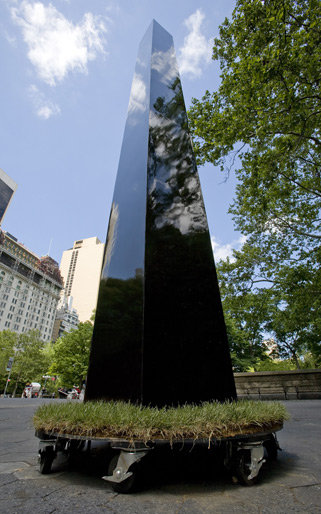Damian Ortega
dal 18/5/2007 al 27/10/2007
Segnalato da
18/5/2007
Damian Ortega
Doris C. Freedman Plaza, New York
Obelisco Transportable

Obelisco Transportable
A 20-foot-tall, narrow, tapering object with a pyramidal top, Damián Ortega's Obelisco Transportable stands on a grassy platform on wheels, as though it has been uprooted from a previous location and made portable. Since ancient times, when the form first emerged in Egypt, obelisks have served as visible centerpieces of cities. Ortega characterizes Obelisco Transportable as "a mobile landmark" that one could potentially move anywhere to commemorate anything. It offers a pragmatic yet wryly playful approach to a global society in which the balance of power is constantly in flux, and in which populations shift and drift from one place to another.
Obelisco Transportable is also a nod to the ways in which public sculptures and monuments have historically been moved from one city to another. Ortega describes this as the "Napoleonic gesture," in which the wartime victor plunders the monuments of captured cities and brings them back home to be installed in public there as a symbol of victory. Such transfers were meant to signal the rise of a new power and the demise of an older one, as well as an exchange of central and peripheral positions. Cleopatra's Needle in Central Park, for example, was originally created in Heliopolis, the ancient Egyptian city, more than 3,000 years ago. During the time of the Roman Empire, it was moved to Alexandria, where it remained for almost two millennia before being offered to the United States as a gift in the 19th century.
Ortega, who until just a few years ago was active as a political cartoonist in his native Mexico, creates sculptures, photographs, collages, and other works that tap into the poetic and symbolic resonance of everyday forms. Using wordplay, visual metaphors, and physical interventions, Ortega investigates the way in which objects serve as markers of cultural and political history. Among his best known works are the three pieces that make up "The Beetle Trilogy" - Cosmic Thing (2002), Moby Dick (2004-5), and Escarabajo (2005) - an epic series that revolves around the Volkswagen Bug as a ubiquitous icon of modernity.
Born in 1967 in Mexico City, Damián Ortega now lives and works Berlin. In 2003, his work was featured in the 50th Venice Biennale. His recent major solo shows include "The Beetle Trilogy and Other Works," Gallery at REDCAT (The Roy and Edna Disney CalArts Theatre) and the Museum of Contemporary Art, Los Angeles (2005); "The Uncertainty Principle," at Tate Modern, London (2005); "Damián Ortega," at Kunsthalle Basel, Basel (2004); "Spirit and Matter," White Cube, London (2004); "Damián Ortega," Museu de Arte da Pampulha, Belo Horizonte, Brazil; "Moby Dick," kurimanzutto, Mexico City; and "Damián Ortega: Cosmic Thing," ICA Philadelphia, Philadelphia (2002).
About Doris C. Freedman Plaza
Named for the founder of the Public Art Fund, Doris C. Freedman Plaza has been the site of more than 40 artist projects and commissions, featuring works by both internationally known and emerging artists including Liz Larner, Sarah Sze, Paul McCarthy, and Mark Handforth.
Sponsorship
This exhibition is made possible through the cooperation of the City of New York, Michael R. Bloomberg, Mayor; Patricia E. Harris, First Deputy Mayor; and Department of Parks & Recreation, Adrian Benepe, Commissioner.
Special thanks to kurimanzutto, Mexico City.
Obelisco Transportable is on view at Doris C. Freedman Plaza, 60th Street and Fifth Avenue, at the entrance to Central Park.
Subways: N, R to Fifth Avenue; 4, 5, 6 to 59th St/Lexington Ave New York.
The work is free to the public and is on view daily.



